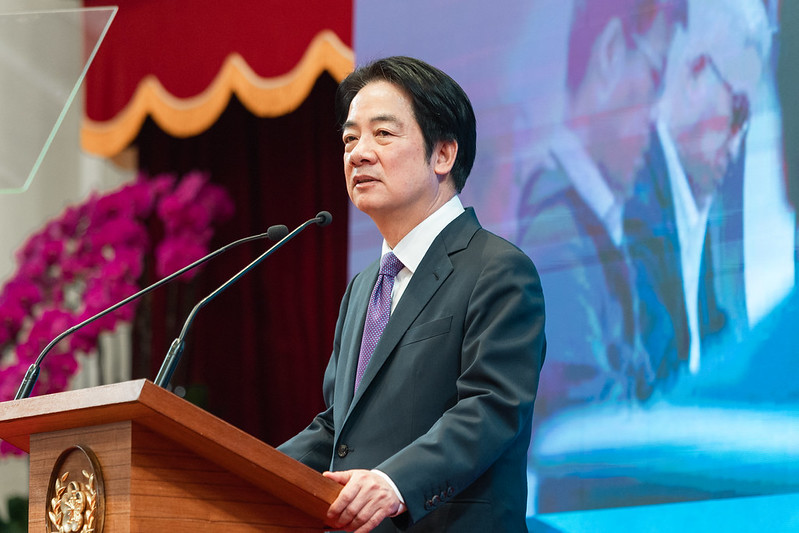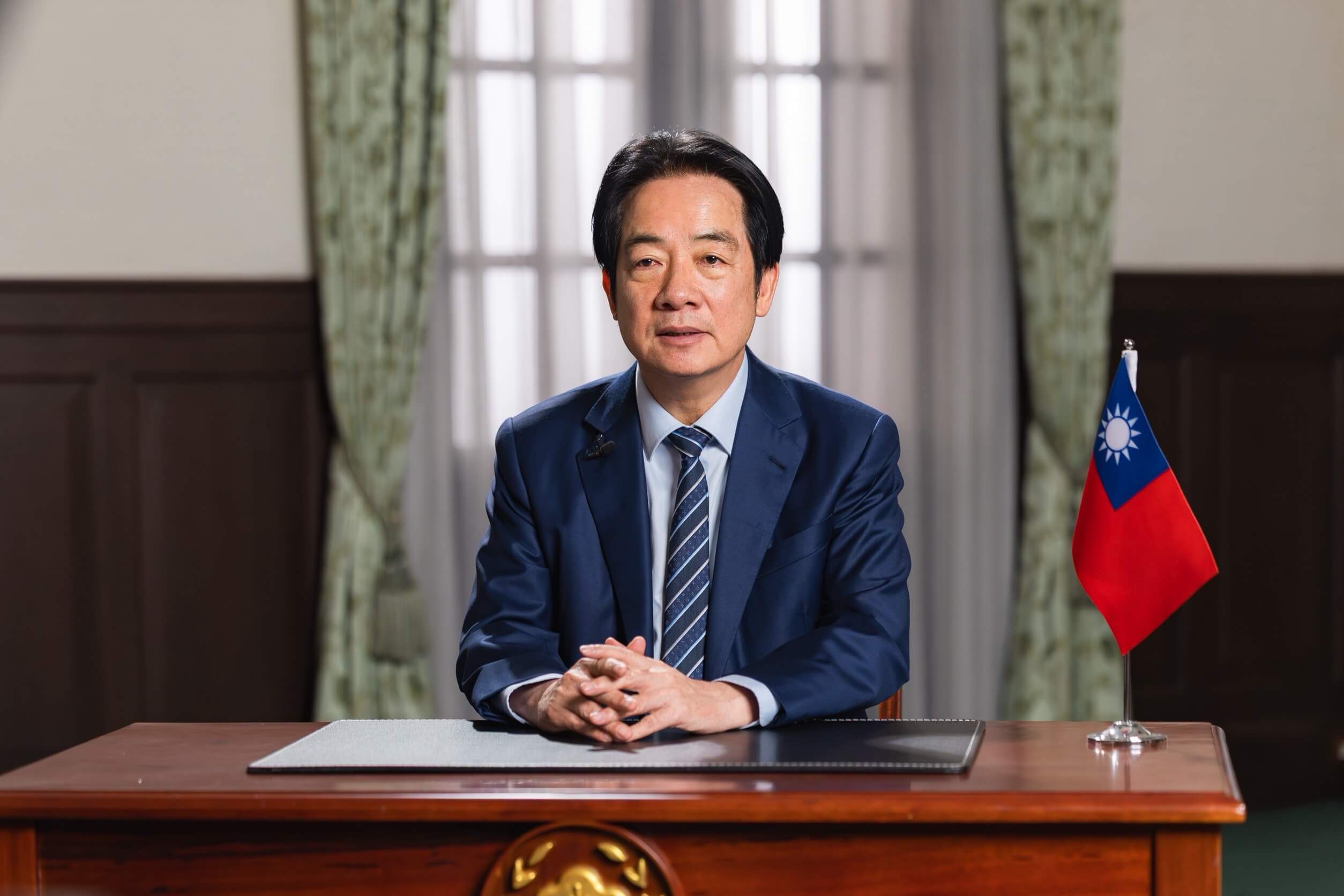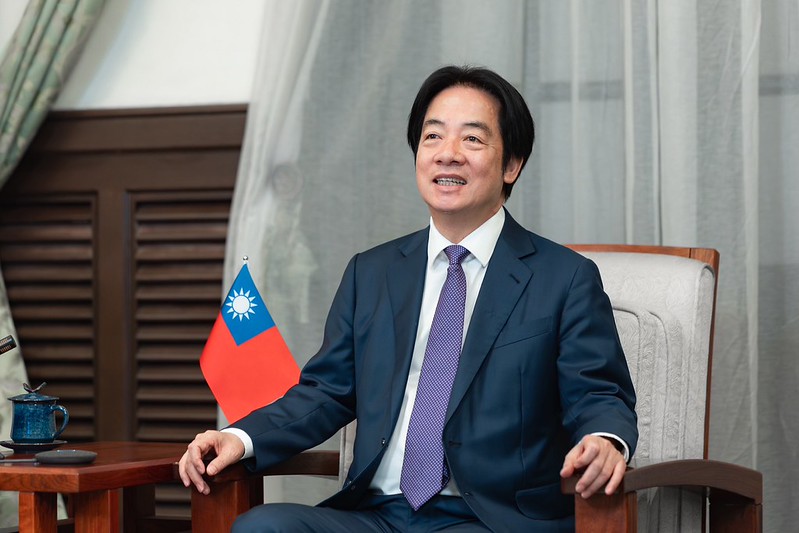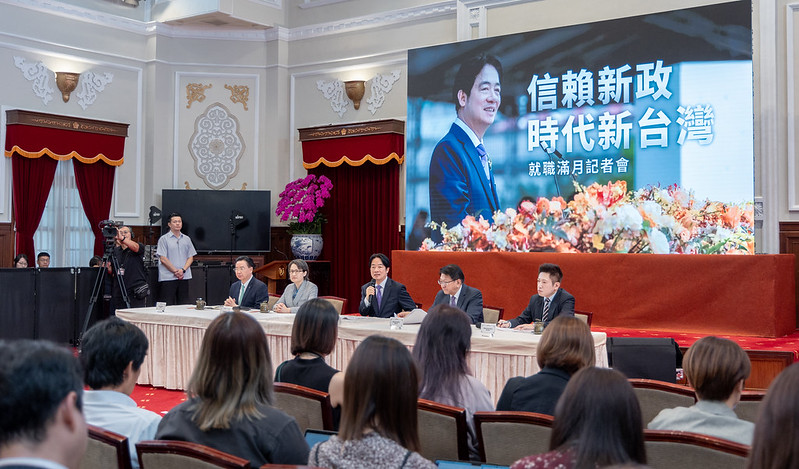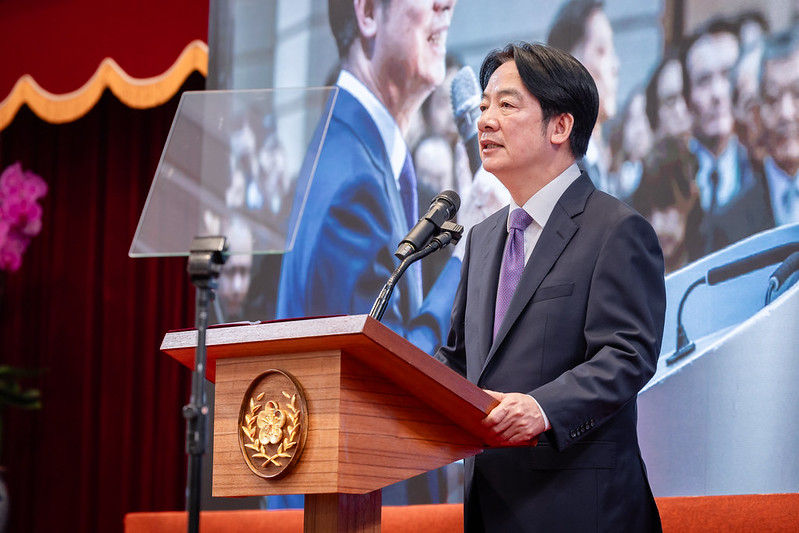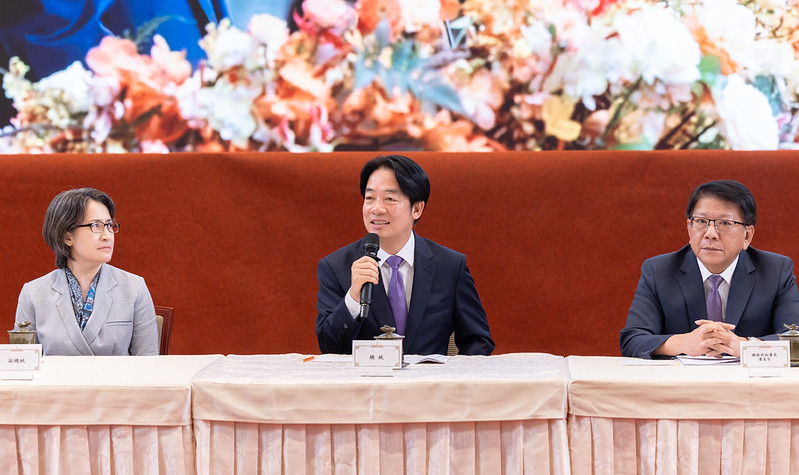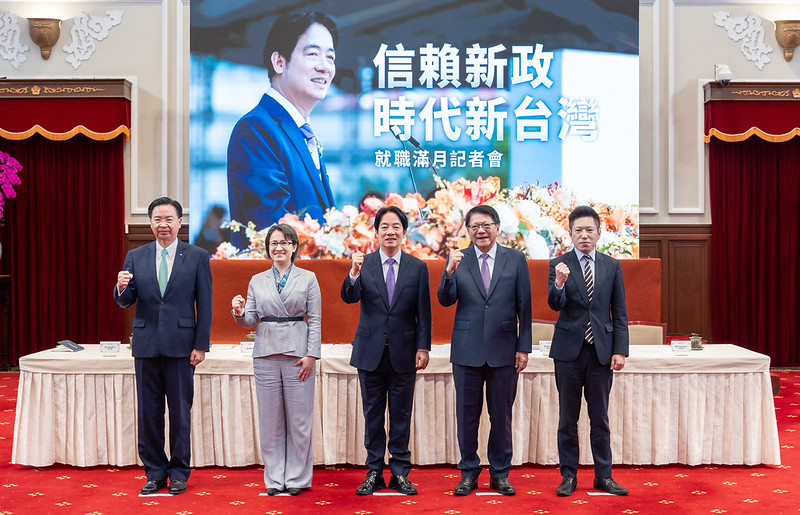News & activities
 News releases
News releases
On the morning of June 19, President Lai Ching-te held a press conference marking his first month in office titled “Building Trust through Policy Initiatives: A New Taiwan for an Era of Innovation” to announce the establishment of three committees at the Presidential Office: the National Climate Change Committee, Whole-of-Society Defense Resilience Committee, and Healthy Taiwan Promotion Committee. In remarks, President Lai noted that the goal of the committees is to develop national strategies, engage in dialogue with civil society, deepen cooperation with the international community, and take action for Taiwan’s future.
President Lai said he believes that as we actively pursue the transition to net-zero emissions by 2050 and participate in global security cooperation, our people will be healthier and our nation stronger, emphasizing that as Taiwan embraces the world, the world also embraces Taiwan. He stated that we are determined and confident as we guide our nation toward a better future, making the Taiwan of the world an even better place that will continue to contribute to the global community.
A translation of President Lai’s remarks follows:
As I am about to reach a full month in office as president, I am here today to announce the establishment of three committees at the Presidential Office. The goal of these committees is to develop national strategies, engage in dialogue with civil society, deepen cooperation with the international community, and take action for Taiwan’s future.
Taiwan occupies a strategic position on one of the world’s busiest shipping lanes; we play a crucial role on the frontline of the democratic world; our advanced supply chains hold the key to the next generation of technological development. The Taiwan of today is a Taiwan of the world.
Anything that happens to Taiwan could send ripples through the entire globe. Therefore, Taiwan’s issues are international issues, and international issues are Taiwan’s issues.
Today, climate change, social resilience, and the promotion of health are three major issues that receive international attention; they also create the largest impact on our citizens.
In response to these challenges, as well as for further cooperation with other countries, I have decided to establish three committees at the Presidential Office, with myself as the convenor. These committees aim to consolidate forces from government and civil society, to provide effective solutions for our country and for the world.
First of all, the impact of climate change and extreme weather events is definitely the largest challenge that humanity faces. In 2022, an annual report from the United Nations pointed out that without proactive measures, average surface temperatures could rise by 2.8 degrees Celsius before the end of the century. And in 2023, we already witnessed the hottest summer in recorded history.
The UN has warned that the issue is not only global warming, but that we have rather already entered an era of global boiling. The World Meteorological Organization has also recorded that Asia is a region heavily struck by climate-related disasters.
We must face the pressing problems of climate breakdown, and the nations of the world must work together. In response to global climate change, we must address these issues faster, stronger, and more proactively.
Whether it is neighboring Japan or Korea, or other advanced democracies such as the United States, many countries have established agencies to address climate change at the level of the president or prime minister, with the goal of adopting proactive measures.
Therefore, I will establish a National Climate Change Committee, with Executive Yuan Vice President Cheng Li-chiun (鄭麗君), Academia Sinica President James C. Liao (廖俊智), and Pegatron Corporation Chairman Tung Tzu-hsien (童子賢) as deputy convenors. The committee will promote climate governance from a national perspective and further transnational cooperation.
Taiwan must not only continue to promote energy transition, but also put into practice the twin green and digital transition, as well as a just transition. We aim to realize a net-zero pathway, build a sustainable green lifestyle and green finance, and enhance environmental resilience to foster a sustainable homeland.
I must also emphasize that transition to net-zero emissions by 2050 is no longer just an idealistic proposal, but an inevitable future. This path is extremely challenging, so we must face reality and rally the entire nation to strive together. We need a more comprehensive strategy to guide businesses and the public, implementing changes in energy, industry, finance, and daily life.
Secondly, in the face of severe disasters caused by earthquakes and climate change, Taiwan must accelerate its efforts to strengthen the resilience of our entire society. The world is watching how Taiwan can demonstrate strong resilience in defending itself and deter the ambitions that seek to disrupt regional peace and stability.
Only when our entire society possesses a strong will for self-defense and an unwavering confidence in ourselves can Taiwan effectively respond to various disasters and risks and grow stronger.
Just days ago, the G7 leaders issued a communiqué, reaffirming that “maintaining peace and stability across the Taiwan Strait is indispensable to international security and prosperity.” This means that as the resilience of Taiwanese society is strengthened, Taiwan’s security is enhanced; and as Taiwan’s security is strengthened, we also enhance global security and prosperity.
Therefore, I will establish the Whole-of-Society Defense Resilience Committee, with Vice President Bi-khim Hsiao, Secretary-General to the President Pan Men-an (潘孟安), and National Security Council (NSC) Secretary-General Joseph Wu (吳釗燮) serving as deputy conveners.
By thinking ahead and being prepared, we aim to make Taiwan stronger and instill greater confidence in our people. In times of national emergency or natural disaster, both the government and society will be able to maintain normal operations.
We need to expand the training and utilization of civilian forces, enhance material preparation and critical supply distribution systems, and strengthen energy and critical infrastructure security. We must improve social welfare and medical networks, as well as evacuation facilities, ensuring the safety of information, transportation, and financial networks.
We need to conduct a comprehensive review and propose solutions to problems, strengthening our resilience in national defense, economic livelihoods, disaster prevention, and democracy. Our goal is to build a stronger and more robust democratic society where we not only safeguard national security, but also maintain regional peace and stability.
Finally, I will establish the Healthy Taiwan Promotion Committee to address the challenges of the post-pandemic era.
In recent years, major challenges threatening our citizens include antibiotic-resistant superbugs, transnational diseases of unknown origin, and cancer, which is the leading cause of death among the Taiwanese population.
Our vision for creating a Healthy Taiwan is to enable people to live long and healthy lives. Dr. Chen Jyh-hong (陳志鴻), convener of the Healthy Taiwan Promotion Alliance, President Wong Chi-huey (翁啟惠) of the Institute for Biotechnology and Medicine Industry, and Minister without Portfolio Chen Shih-chung (陳時中) of the Executive Yuan will serve as deputy conveners for the Healthy Taiwan Promotion Committee.
We aim to advance the Healthy Taiwan Cultivation Plan through a health charter. We will improve the employment environment to attract and retain talent. We will optimize the National Health Insurance system for sustainable operation. We are committed to promoting holistic healthcare models and accelerating the application of smart healthcare technologies. Furthermore, we will establish a NT$10 billion fund for new cancer drugs, fully advancing our national plan for cancer prevention and treatment.
I have never forgotten my mission as a doctor. I hope to gradually build a Taiwan where the number of years that people live with illness or disability is reduced, and that spent in health is increased.
In the future, we must take action to promote healthy living for all, enhance lifelong care, and align Taiwan with sustainable health development around the globe. We must also look toward international cooperation to foster global solidarity in the post-pandemic era.
These three committees not only signify unity and collaboration within the current administration and across ministries, but also embody a spirit of interdepartmental, cross-disciplinary, and public-private sector cooperation.
These three committees will convene quarterly meetings. We will establish efficient communication platforms to foster social consensus and actively translate our goals into action. By harnessing the strengths of industry, government, academia, research institutions, and civil society sectors, we can effectively address global issues, making Taiwan’s strategies a global solution.
In today’s interconnected world, every step Taiwan takes forward is a step forward for the world. Taiwan has capability, technology, and experience to share with the global community.
According to last year’s rankings from the Economist Intelligence Unit and this year’s report from the Centre for Asian Philanthropy and Society, Taiwan is recognized as the most democratic and charitable country in Asia. Our achievements in democracy and our actions as a force for good have received international recognition.
I believe that as we actively pursue the transition to net-zero emissions by 2050 and participate in global security cooperation, our people will be healthier and our nation stronger. As Taiwan embraces the world, the world also embraces Taiwan.
I also want to emphasize that addressing these global issues and challenges requires significant effort and long-term investment of resources to yield results.
If we do not start taking action today, we will fall behind tomorrow. So, the time for action is now.
Today, the government shoulders its responsibility and leads by example. We are determined and confident as we guide our nation toward a better future, making the Taiwan of the world an even better place that will continue to contribute to the global community. Thank you.
Also in attendance were Vice President Hsiao, Secretary-General Pan, NSC Secretary-General Wu, and Deputy Secretary-General to the President Xavier Chang (張惇涵).

